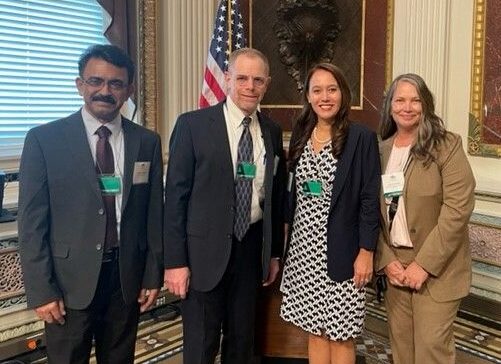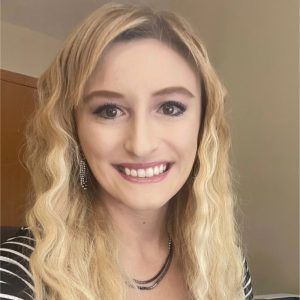
With the reigniting of the White House’s Cancer Moonshot Initiative, the ABTA recently joined the Cancer Moonshot Brain Cancers Forum in Washington, D.C., to discuss opportunities in discovering treatments for brain cancers, including GBM.
Below are top five key takeaways for you from our Chief Mission Officer, Nicole Willmarth, PhD:
Key Takeaways
1) The reigniting of the Cancer Moonshot Initiative is significant for the brain cancer community because:
We all want to drive progress quickly, and that’s going to take stakeholders from all over the brain tumor community. We’re trying to spur new ideas around research, collaborations, and the commitments that we make as advocacy groups to improve patients’ quality of life, to provide more resources and support for those who are navigating a brain tumor journey. So, there’s a renewed focus on developing plans and trying to be bold in our approaches to take on cancer and to, as they say, end cancer as we know it.
2) Some of the issues discussed during the forum:
- The need for a better understanding of tumor heterogeneity (differences between cancer cells within a single tumor).
- The ways the tumor is interacting with the brain and how that may actually feed the tumor and make it more aggressive.
- The blood-brain barrier and drug delivery challenges.
- Immunotherapy and its future role in innovative treatments.
- How we can decrease barriers for patients to get better care. Examples: access to clinical trials or investigative therapies.
- Models from other cancers that researchers could look at and apply to brain cancer.
3) Why hope is on the horizon:
I’m most hopeful of the renewed interest and focus on the urgent need to make progress in brain tumors. Truly, we’re on the cusp of so many different discoveries that give me hope, that I just know there’s going to be improvements for patients. I feel that there’s going to be improvements for patients within the next 5 to 10 years. The good thing is there’s so many brilliant researchers who are very passionate about this and they really want to make a difference. And that gives me hope that the next discovery is just around the corner.
4) What’s next:
Really, the Cancer Moonshot Brain Cancers Forum, the conversations we had there, it’s just the beginning. It’s all of us coming together collectively, but also all of us showing that we are committed, individually, to making a difference. And that’s what the Cancer Moonshot is looking for, and that’s what we also need to show up for—that we’re going to make a difference ourselves as an organization that supports brain tumor patients. You know, it was really inspiring to be around so many passionate people in the brain tumor community, but we also want to see action as a result.
5) The ABTA remains the champion of the brain tumor community and will continue to advocate for you through events like the Cancer Moonshot Brain Cancers Forum.
The ABTA is perfectly poised to do this because we reach so many patients—around 100,000 per year. We want to double that with our Meet Hope Head On campaign. We also want to advocate for more federal research funding. When you think about how many patients are impacted by a metastatic brain tumor—even though primary brain tumors are considered rare—metastatic brain tumors impact an estimated 200,000 people per year. So really, the number of brain tumor patients impacted every year is much larger than many people think. We need to build more awareness around that. And that will only help us to influence federal funding and try to increase the dollars invested for brain tumor research.
How can YOU get involved?
- Share your brain tumor story.
- Learn more about our Meet Hope Head On campaign.
- Download our advocacy toolkit.
- Donate to support our mission.

Jessie Schlacks
Jessie is Managing Editor of the bi-monthly e-newsletter MindMatters. Submit story ideas or questions to jschlacks@abta.org.


















